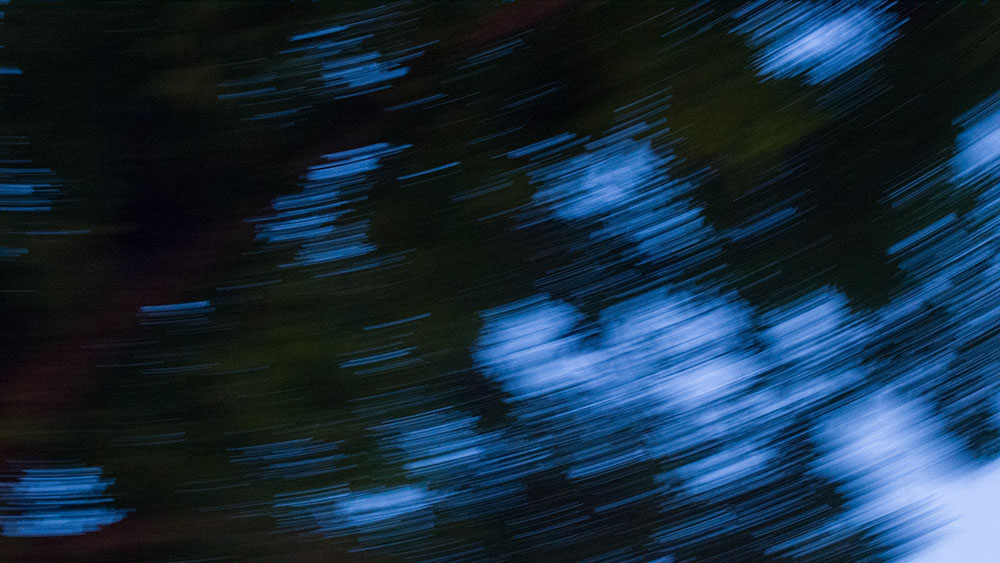Outside it is raining again. Rain has become so common that its most remarkable qualities are longevity and persistence. The time-honored moodiness attendant on rain has been pushed to the periphery by the unbelievable duration of it all. I notice this in the shopkeepers, pedestrians, and myself. We now take umbrellas instinctually as we cross our thresholds whether or not water is falling from the sky. Our worldview has turned moody with the long-falling rain. It feels inevitable, an inescapable phenomenon in a moody world, more akin to dead leaves than snow. I sense drear and pessimism metastasizing inside myself. I see it in the eyes of passersby. We’ve come under a rainy spell and don’t believe in the umbrellas we’re holding anymore.
How quickly the shape of the world changes! How easily we are fooled! Of course, the world is not defined by rain any more than it is by sun. I see it. Yes, I see you world. This smile curling my lips is nothing other than knowingness. I recognize the flicker of your expressions, but I look longer until I discern your immutable face. What a joyous face! What a happy curve! Beyond this shroud of rain you look on us smilingly in your roundness. No meteorology can disfigure an uncrackable orb!
I’m reminded of a bar owner with whom I recently spoke. He is old, a brown beard blends his chin to his neck, and there is a childish brightness in his eyes that causes me to hesitate each time I leave his bar. Yesterday, I turned back from the door and initiated a conversation with him. I told him about the observation I had made of his eyes, and, to my surprise, he told me that as a child he had made an identical observation concerning his grandfather’s eyes. I asked if this was a family trait, the life in his eyes, and he said no. His mother, father, grandmother, aunts, uncles, cousins, and brothers were all stricken with glassy eyes, dreary eyes, dim eyes, flat eyes, desperate eyes, and innumerable other unwholesome ocular variations. In fact, he informed me, until the moment I shared my observation with him he had always assumed his eyes were of a piece with theirs.
“No, no,” I assured him. “Your eyes are bright.” It was then I realized that I had become a regular of his bar not for the quality of its beer and sandwiches, but because I enjoyed my idle glimpses of the owner’s eyes. I was inspired by them, you might say. They woke thoughts that I treasured later, walking with umbrella in hand.
I asked him what connection he could surmise from this parallel between his and his grandfather’s eyes. The big man paused for a moment and scratched his bearish beard. I saw thoughts flicker, furrows across his face tighten, then loosen. “Well,” he said, “my grandfather always told me we were alike. I took him to mean in the way we liked birds, were left-handed, and ate everything with a knife and a fork. But that doesn’t account for it. We share a name but that is no explanation either. My father also shared our name and his eyes were cold and dry like an old cheese. I’ll tell you what I think, and it is a strange thought. On the day my grandfather died a curious feeling came over me that wasn’t sorrow. I’ve never felt sad for him. Never shed a tear. On that day, I felt a sense of enormous well-being. I was flooded with a warmth I hadn’t known before, and it remains with me to this day. I believe I became him on the day he died. I would go so far as to say that, even as you are looking at me, I am, marginally, my grandfather.”
We shared an introspective moment of quiet and then I thanked the barman for his seriousness and told him I understood. I said, “I’m happy to know you, but I have to be going. There is a room full of students waiting for me.” I was teaching that afternoon and had passed my lunch break in the man’s bar, as has become my custom these rainy weeks.
He shook my hand heartily and then, in the act of leaving, I hesitated once again. “I believe you are your grandfather. At least in the ways that count,” I said before crossing the threshold and walking outside. After only a few steps a fellow pedestrian, hunched under an umbrella, passed me and said with the morose belligerence that has inhabited all of our voices, “Don’t you know you’re getting all wet?”
“You’re quite right,” I replied and unfurled my large, black, freshly oiled umbrella. “But you must know,” I called after him, “the rain is merely a disguise. The world is as round this dark November day as it was on the warmest August afternoon. It is an uncrackable orb, you see, and we must understand that it has a playful sense of self and, like us, loves adventure. Old men and women are fond of saying patience brings roses. It is true. The good will come, don’t worry.” But by then I had lost the fellow to the rain, and was only speaking to myself. “So be it,” I said to the next raindrop I saw and, as I walked towards my classroom full of students, the rain slowly turned to snow.

